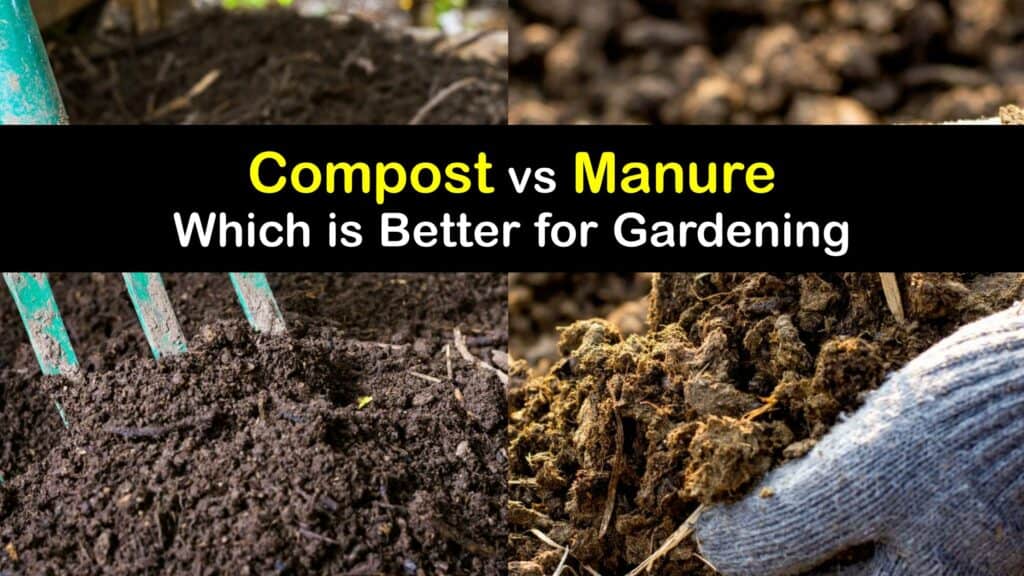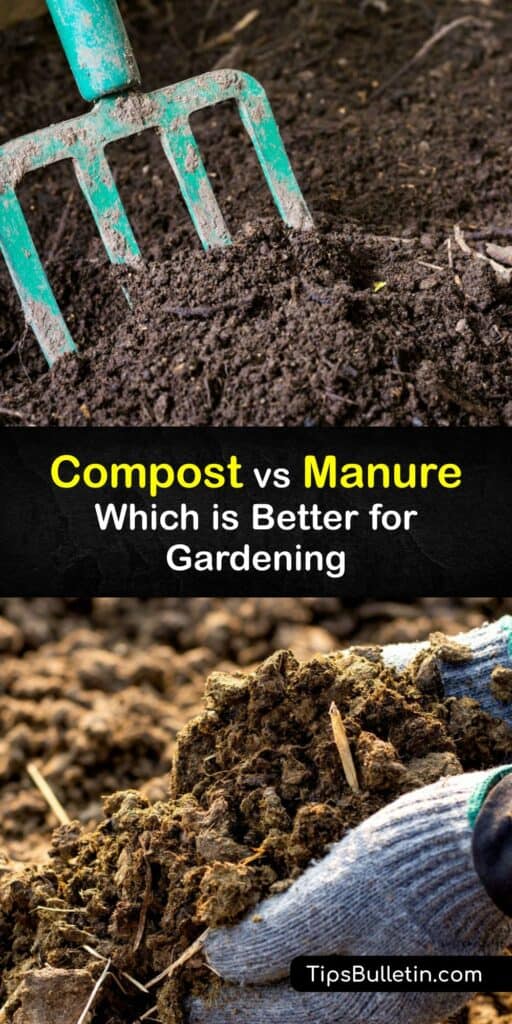If you’re a new gardener, you’ve probably come across articles explaining how to use synthetic fertilizer, natural fertilizer, organic matter, green manure, compost, or manure to enrich the soil before and after planting. With all these different terms, the entire planting process is often puzzling. Discover the difference between compost vs manure and their applications to help take the guesswork out of fertilizing your plants.
Compost materials and animal manure are essential for improving the soil structure and returning nutrients to the topsoil. They are useful for soil amendment if you have poor or sandy soil. However, it’s vital to understand their differences before applying them to the vegetable garden.
There are many types of farmyard manure, from poultry manure and horse manure to rabbit manure and steer manure, and they are all beneficial for soil health, but there is a difference between fresh manure and composted manure. If that’s not confusing enough, not all compost contains manure.

Difference Between Manure vs Compost
You’re preparing the soil for planting, but you’re not sure whether to use compost materials or animal manure as an organic fertilizer. With all the varying fertilization products, this confusion is understandable. What’s the difference between steer manure vs compost? What about rabbit manure fertilizer and the product of your vermicomposter?
Compost is the end product of yard and food waste, while steer manure is animal waste. The different types of compost require different methods to make. There are many ways to compost horse manure and dung from other animals. Learn the other differences between compost vs cow manure and their applications to ensure you use the proper material.
What’s the Difference Between Steer Manure vs Compost?
Steer manure is beneficial for amending the soil, but it is quite strong and may burn plants if you misuse it. Explore the differences between steer manure vs compost to help you pick the right one.

Steer manure is bovine waste and has a high potency with a 14-5-8 nitrogen/phosphorus/potassium ratio. While it offers the same benefits as other manures, raw manure is too strong for plants.
It’s crucial to use aged manure or make manure compost to prevent damage to the plant. The way to compost chicken manure is the same as composting steer manure. Pig manure fertilizer is beneficial for garden plants like other manure types.
Compost is comprised of a mixture of brown and green materials like food scraps for compost that have gone through the decaying process, and it’s safe to apply to the soil at any time.
Compost vs Cow Manure for Gardening
Cow manure contains less salt than steer manure, and it’s not as potent, making it a better choice for many home gardeners. However, what’s the difference between compost vs cow manure?
Compost is what you get when you mix brown and green organic material like yard waste, chicken manure, and food scraps with water in the compost pile. The National Organic Program recommends turning compost five times daily within 15 days. After several weeks of decomposition, you have a fertilizer to add to potting mix or garden soil.
Cow manure is feces made up of digested grain and grass. It’s an all-purpose fertilizer containing very few weed seeds. The way to compost cow manure is to process it through heat or have it turned into compost manure before using it, which removes E. coli and other contaminants. It’s not a good fertilizer choice if you have clay soil.
Nutrient Values of Manure vs Compost
The best way to enrich the ground and encourage healthy plants is to add organic matter to the garden. However, nutrients vary between compost vs potting soil vs manure. Find out about the nutrient values of manure and compost to ensure you give the soil what it needs.
Cow manure is rich in nutrients and organic materials, and it contains 3 percent nitrogen, 2 percent phosphorus, and 1 percent potassium. Additionally, it has beneficial soil bacteria, allowing nutrients to release slowly without burning plant roots. Manure does help plants when added to compost. Unfortunately, cow manure has high ammonia levels, which burn plants if you apply fresh manure directly.
Compost has decent amounts of nitrogen, phosphorus, and potassium with sulfur, magnesium, and calcium traces. It’s easy to mix compost into the soil when you start planting seeds or seedlings.
The amount of each nutrient in compost varies depending on the organic materials you add to the bin. Put kitchen waste in your compost as well as grass clippings and leaves. Enjoy a no-waste household when you have a compost pile.
For example, mushroom compost has fewer nutrients than traditional compost and contains more salt. When comparing mushroom compost vs cow manure, compost manure is the best choice.
Application Differences Between Compost vs Manure
The first step in outdoor planting is to decide whether to use manure or compost for the vegetable garden. Once you’ve got that figured out, it’s time for application. There are different ways to apply compost vs manure.
Sprinkle compost around a plant’s base to give it a pick-me-up. If you prefer deep-feeding, till a two to three-inch layer of either compost or treated cow manure into the soil before planting, or mulch a half-inch layer over the top of the bed.
If you plan to use manure as natural fertilizer for vegetables and fruits, it’s vital to use composted cow manure. You can use sheep manure for the garden, too, as well as rabbit dung, and horse poop. Do not use dog manure fertilizer for your edible plants – save it for your flowers.
A great way to use cow dung and way to use manure in the garden is to make manure tea. Fill a five-gallon bucket two-thirds of the way with water, add enough manure to fill the container the rest of the way, and let it sit for a day or two.
Stir the liquid once or twice daily, and let it sit still for an hour before pouring it into another container. Use the tea to water just about any plants but root crops like potatoes, carrots, turnips, and radishes.
Organic material is essential for keeping the soil rich and promoting healthy plant growth. While compost and manure both consist of decomposed materials, they are not the same; it’s necessary to understand their differences before putting them in the garden.

Now that you understand the differences between compost vs manure and which one is best for your yard, why not share our manure and compost guide with your friends and family on Pinterest and Facebook?